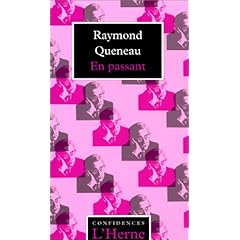 --The blurb--
--The blurb--"Irène and Etienne no longer love each other; neither do Sabine and Joachim. These couples are going with the last metro, and passers-by pass, while beggars remain. A loving and enigmatic chorusing song which nothing can stop from lasting infinitely, just like Queneau's famous Exercises in Style."
from www.amazon.fr; translation mine
--The review--
The idea of "the last train" seems to be a common theme in French media, with the most famous example perhaps occurring in François Truffaut's film set in the Second World War, Le Dernier Métro, where the title refers to one prong of persecution of the Jews (who had to make sure they did not miss the last train home in order to escape punishment for still being out after the Nazi curfew). Raymond Queneau's En Passant is, like this film, still a love story, but the concept of "the last train" and the way it features in this play is arguably far less sinister.
It is the buzzer at the station that brings the play's characters back to reality, reminding them that their interactions with their fellow travellers are but fleeting moments, whose transience is destined to give way to their usual day-to-day statuses. The play is short and impactful, and kept minimalist due to the composite set and the small circle of characters. Written and published in 1944, it precedes Pinter by over ten years, and yet the resemblance between the two playwrights' work is striking (though this is, in fact, Queneau's only play), with much value being found in simplicity and in the power of silence. This simplicity also provokes surprise as to why this piece of work by Queneau has never been translated into English, despite the fact that it is as progressive as his most famous piece of work, Exercices de style (Exercises in style).
After playing out the short, dramatic and effective story with Irène and Etienne, and the male passer-by, Queneau then experimentally turns the formula on its head, repeating the same story with a little variation in dialogue, but this time featuring Sabine and Joachim, and a female passer-by, in the starring roles. Perhaps the benefit of this inversion and repetition is more apparent when the play is seen on the stage, but on the page it lacked impact due to its exact duplication of the plot.
Nevertheless, this play is a hidden gem within Queneau's diverse catalogue of work. The relationships within it are well-built, and concisely and tersely played out, without any loss of feeling despite the perhaps anodyne setting. And, if you like trains, you could always try his second-most-well-known work, Zazie In The Metro.
Other works by Raymond Queneau (translated works only)
The Bark-Tree (1933)
The Last Days (1936)
Children of Clay (1938)
Pierrot (1942)
The Skin of Dreams (1944)
We Always Treat Women Too Well (1947)
A Hard Winter (1948)
The Sunday of Life (1952)
Zazie in the Metro (1959)
The Blue Flowers (1965)
The Flight of Icarus (1968)





No comments:
Post a Comment